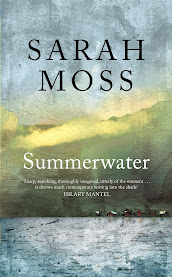SUMMERWATER (2020)
By Sarah Moss
Picador, 125 pages.
★★ ½
If you thought I was neutral about the movie Dune, I’m positively cowardly in my evaluation of Summerwater. I rated it 2 ½ stars because my wife loved it and I was pretty much annoyed with it from start to finish. Luckily, at just 125 pages, the finish came quickly. It’s short because its inspiration is a poem: William Watson’s “The Ballad of Semmerwater.” You will notice that Watson wrote Semmerwater rather than Summerwater. That’s appropriate, as the setting is in the Trossachs region of Scotland, where Watson’s spelling would be more in line with local brogues.
From what I gather from how others have rated it there is a decided gender breakdown concerning this novella from Sarah Moss. The best part of Moss’ work is that most of what we read is what is seldom said: the internal perceptions and judgments of characters, most of whom wouldn’t dare voice their thought bubbles. That’s especially the case because most of them are English and they are not known for being vocal about their emotions.
Think of Summerwater as one day in a vacation from hell. It is set in a holiday park, a British phrase that references destinations of various quality in which there are activities that encourage guests to stay within the camp confines most of the time. We infer from the context that this park is more rustic than posh. What is not open to interpretation is the weather. The six families gathered therein have seen rain, rain, and more rain. Most are going stir crazy and we all know that crazy is crazy. In such matters, reason tends to fly out the door.
Among the guests are a teenage boy forced to share a room with his sister and looking for a place where he can masturbate in peace. That leads to a kayak trip in the wind and teeming rain that could have ended quite badly indeed. There is a young married couple seeking mutual orgasm, or at least he is; she is thinking about everything else under the “bruise-colored clouds.” There are kids on a lochside swing set that sways over the water, an elderly couple peeking out at others, a man in a tent whom an obsessed jogger imagines an axe murderer (he’s not); a busy mother given an hour to herself and cleans because she can’t think of anything else to do; and a loud group of partying Eastern Europeans of indeterminate origin that induce outrage among everyone else–perhaps because they actually wish they too had joie de vivre.
Those who like Summerwater have praised its elemental qualities; that is, its mix of sky, water, animal, land, and human interactions. It also wins kudos for its style that has won raves from Hilary Mantel. That’s another way to tell if this book is for you. Mantel is the acclaimed author and two-time Booker Prize winner for her novels on Thomas Cromwell. If you think she’s a marvel, try Summerwater; if you find Mantel’s work more style than substance, you’ll feel the same about Moss.
An oft-made comment is that Summerwater is a funny book. It is amusing to contemplate what we might hear if the aforementioned thought bubbles took on a life of their own. My beef is that I didn’t care what any character thought about anything. They reminded me of those whom I got out of my way to avoid: whiny, self-centered people who complain about everything. Critical thinking is one thing, but you know the type to whom I allude, those with such low esteem that they judge others so they can feel self-righteously superior. But what do I know? Like I said, my wife loved this book.
Rob Weir





